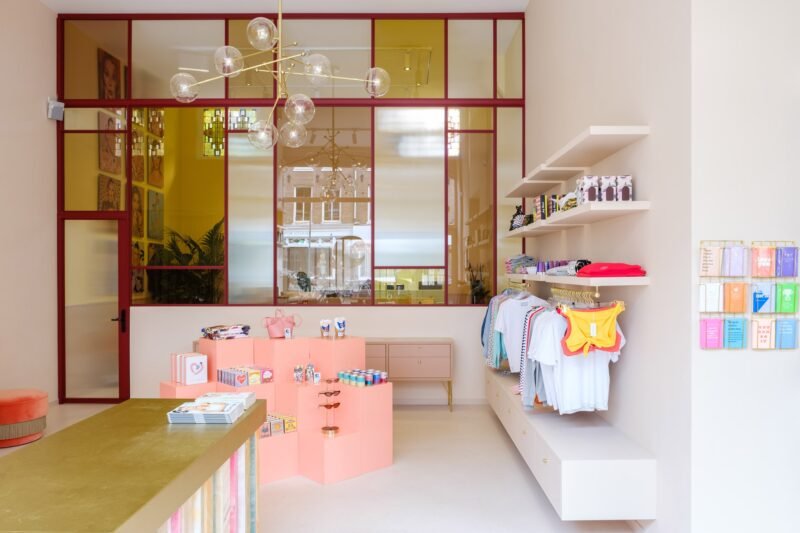Does Our Environment Affect The Way We Work?
Companies are becoming increasingly aware of the importance of healthy work spaces. International corporations such as Google and Facebook have pioneered a new way of working in open, flexible workspaces which break away from the traditional ‘cubicle’ style. Dutch designers KNOL wanted to test just how much our surroundings impact on the way we work, and how we feel when we work.
In a disused warehouse in Eindhoven, a transformation took place over the course of one month. It began as an open office, with five different thematic spaces in an open area of 300m². The variety of colourful working stations allowed visitors to choose an environment depending on how they felt, and also gave them the ability to move around between areas throughout the day. The ‘Out of Office’ project included a series of playful features including a garden complete with live rabbit, a sociable coffee bar, a library, and a comfortable bed in which one could sleep on a break as well as work from. “Freedom on the work floor helps create the most satisfied and productive workers,” say KNOL, as workers are able to move between work stations as their mood and productivity changes throughout the day.


From Google-ish playground (left) to grey office floor (right)
Offices around the world are increasingly becoming more creative, pushing for the use of open office spaces, as well as many companies promoting hot-desking, increasing flow to the office as well as saving space. There has concurrently been a rise in pressure to work from home, saving companies desk space and money. The use of public spaces such as parks and coffee shops as temporary work stations has also increased in recent years, blurring the line between work and leisure time.


KNOL took on this idea of merging social and work spaces, creating five zones which mirrored modern places of work. Within the warehouse there was a bed, a living room, a garden, a library and a coffee bar, which, for better or worse, have all become places people are now familiar working in. ‘Basics’ were established, such as having wide opening hours, mirroring the flexible hours people often work today, as well as plenty of electricity sockets, readily-accessible coffee, as well as fast and free wifi. With the rapidity of change to how we work, KNOL recognised the necessity to change our work environment along with our new ideals. The key tenets of “flexibility, autonomy and inspiration” helped create the Out of Office spaces. We can now work anywhere, any time, and the diversity of the warehouse environment embodied just that.


The project took the test one stage further, however, and gradually changed the office environment over the course of the month. As word of the creative space spread and more people arrived to benefit from the innovative design, KNOL gradually took away the quirky features and replaced them with standardised grey cubicles. The bright reds, blues and yellows that had brightened up the office space were gradually stripped away to reveal their grey bases, and plain desks were steadily arranged into regular grid patterns.

As word of the creative space spread and more people arrived to benefit from the innovative design, KNOL gradually took away the quirky features and replaced them with standardised grey cubicles

By the end of the month a strict office environment was simulated, with the addition of a virtual ‘Big Brother’ boss projected onto the wall of the warehouse. Through motion and sound detecting technology ‘Steve’ kept an eye on workers’ movements and hushed them when noise levels became too loud. Coffee and lunch breaks were limited to specified hours, as announced by Steve, and the entire space became far more regulated.


By varying the office environment from one extreme to another, KNOL was able to carefully measure the responses of the people who used the space. Initially, the innovative flexi-space gained much praise. The personal feel of the different areas gave people a sense of ease not often found in an office environment. One user commented that “We need more spaces like this!”, and generally the transition away from freedom of space was unappreciated.


‘Big Brother’ boss Steve keeps an eye on the workers
However, it is important to remember the flipside of this freedom: “We are practically always at work. A lack of imposed discipline leaves us completely dependent on our self-discipline. Studio KNOL wants to investigate if we have gotten carried away with the trend of being extremely flexible.” One ‘flexworker’ acknowledged that “working in a cubicle is less cosy but it does increase my productivity.”


The conclusion appears, however, that work space – as with living space – is very personal. The freedom to choose your own space and hours is particularly important, however the rigidity that comes with a strict office timetable is certainly there for a reason. KNOL set out to ask “Would we enjoy having more set and limited working hours? Aren’t we more productive when we add some externalised discipline to our work environment?”
The socio-architectural experiment encapsulates our working past, present and future, and presents some interesting ideas about work spaces for the future.



